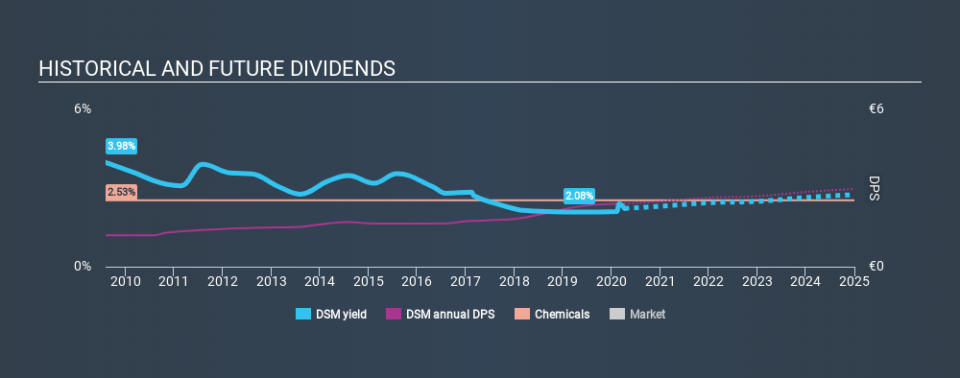Koninklijke DSM N.V. (AMS:DSM) Is An Attractive Dividend Stock - Here's Why

Is Koninklijke DSM N.V. (AMS:DSM) a good dividend stock? How can we tell? Dividend paying companies with growing earnings can be highly rewarding in the long term. If you are hoping to live on your dividends, it's important to be more stringent with your investments than the average punter. Regular readers know we like to apply the same approach to each dividend stock, and we hope you'll find our analysis useful.
While Koninklijke DSM's 2.2% dividend yield is not the highest, we think its lengthy payment history is quite interesting. The company also bought back stock equivalent to around 3.8% of market capitalisation this year. There are a few simple ways to reduce the risks of buying Koninklijke DSM for its dividend, and we'll go through these below.
Click the interactive chart for our full dividend analysis
Payout ratios
Dividends are usually paid out of company earnings. If a company is paying more than it earns, then the dividend might become unsustainable - hardly an ideal situation. Comparing dividend payments to a company's net profit after tax is a simple way of reality-checking whether a dividend is sustainable. In the last year, Koninklijke DSM paid out 56% of its profit as dividends. A payout ratio above 50% generally implies a business is reaching maturity, although it is still possible to reinvest in the business or increase the dividend over time.
Another important check we do is to see if the free cash flow generated is sufficient to pay the dividend. Koninklijke DSM's cash payout ratio in the last year was 39%, which suggests dividends were well covered by cash generated by the business. It's positive to see that Koninklijke DSM's dividend is covered by both profits and cash flow, since this is generally a sign that the dividend is sustainable, and a lower payout ratio usually suggests a greater margin of safety before the dividend gets cut.
Consider getting our latest analysis on Koninklijke DSM's financial position here.
Dividend Volatility
Before buying a stock for its income, we want to see if the dividends have been stable in the past, and if the company has a track record of maintaining its dividend. Koninklijke DSM has been paying dividends for a long time, but for the purpose of this analysis, we only examine the past 10 years of payments. The dividend has been stable over the past 10 years, which is great. We think this could suggest some resilience to the business and its dividends. During the past ten-year period, the first annual payment was €1.20 in 2010, compared to €2.40 last year. This works out to be a compound annual growth rate (CAGR) of approximately 7.2% a year over that time.
Companies like this, growing their dividend at a decent rate, can be very valuable over the long term, if the rate of growth can be maintained.
Dividend Growth Potential
Dividend payments have been consistent over the past few years, but we should always check if earnings per share (EPS) are growing, as this will help maintain the purchasing power of the dividend. It's good to see Koninklijke DSM has been growing its earnings per share at 43% a year over the past five years. Earnings per share are sharply up, but we wonder if paying out more than half its earnings (leaving less for reinvestment) is an implicit signal that Koninklijke DSM's growth will be slower in the future.
Conclusion
To summarise, shareholders should always check that Koninklijke DSM's dividends are affordable, that its dividend payments are relatively stable, and that it has decent prospects for growing its earnings and dividend. Koninklijke DSM's payout ratios are within a normal range for the average corporation, and we like that its cashflow was stronger than reported profits. We like that it has been delivering solid improvement in its earnings per share, and relatively consistent dividend payments. Overall we think Koninklijke DSM scores well on our analysis. It's not quite perfect, but we'd definitely be keen to take a closer look.
Companies possessing a stable dividend policy will likely enjoy greater investor interest than those suffering from a more inconsistent approach. However, there are other things to consider for investors when analysing stock performance. For instance, we've picked out 1 warning sign for Koninklijke DSM that investors should take into consideration.
If you are a dividend investor, you might also want to look at our curated list of dividend stocks yielding above 3%.
If you spot an error that warrants correction, please contact the editor at editorial-team@simplywallst.com. This article by Simply Wall St is general in nature. It does not constitute a recommendation to buy or sell any stock, and does not take account of your objectives, or your financial situation. Simply Wall St has no position in the stocks mentioned.
We aim to bring you long-term focused research analysis driven by fundamental data. Note that our analysis may not factor in the latest price-sensitive company announcements or qualitative material. Thank you for reading.

